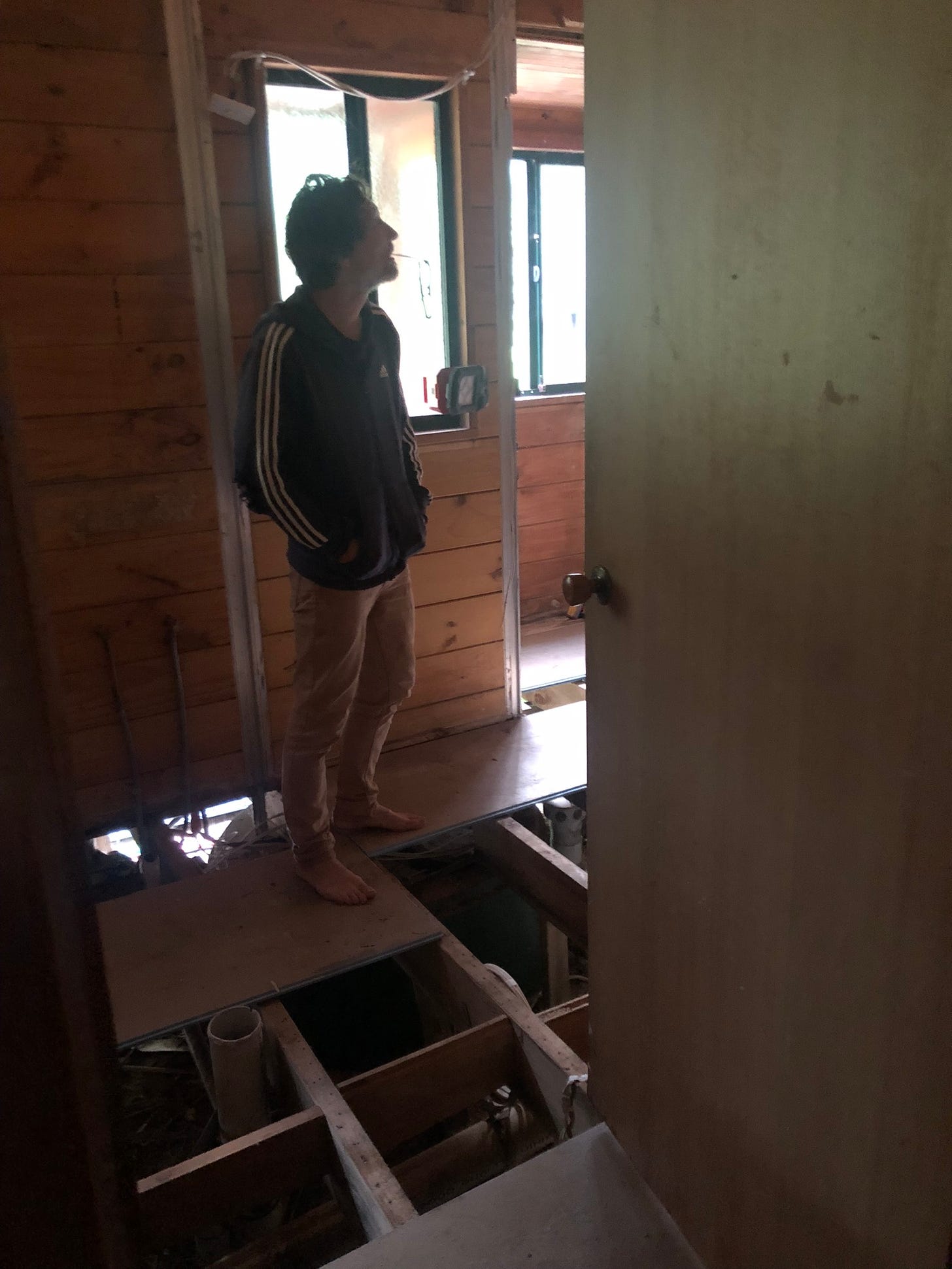The bathroom reno continues at the Mogantosh ranch. Animals keep stealing the outside-soap, the waterproofer has spent the afternoon filling the air and our deepest sinuses with the most bracing of solvents, and in a thrilling edge-of-seat show of brinksmanship, the PortaLoo man arrived during the week to pump out the tank barely moments before an imminent overflow.
It’s the shortest day and longest night of the year. A chill-factor of Polar Penis 10 makes the outdoor shower a painful prospect. This morning, the builders were arriving at seven, so I had to shepherd two shy teens through their ablutions early. The first shower, at 6am, occurred in the dark. I put towels in the dryer (currently located in the loungeroom) to sweeten the deal, and promised that everybody would obey the no-peeking honour system. I visited the Portaloo, stocked up the toilet paper and replaced yesterday’s hand towel with a fresh one.
The sun was rising as I encouraged Teen 2 into the shower. While I brushed my teeth at the kitchen sink, Biggles started going crazy and I realised two things: 1. the builders have arrived and 2. I still haven’t found the dog Valium. I put a meal in the slow cooker for the evening, liaised with the builders and sorted out three children for their days ahead. One child is currently home-schooling, one had a virus all last week while managing her HSC, and the smallest went down with plague as soon as her sister recovered.
In the normal run of things, I impose order and structure and quiet in my days to corral the chaos of my brain. The constant task-switching demanded of me in this moment is difficult. Keith is very good at taking Biggles when he can’t cope with all the banging and smells and strangers in his house; but if he is out, I find myself, at times, typing one-handed while holding the squirming dog’s collar. There’s a country song in that somewhere.
But before all of this hectic activity of the morning, I had a small window of pre-dawn quiet in which to work on my novel. I’m stubbornly, perhaps stupidly attached to the brick-by-brick creation of this world that belongs only to me. On many mornings, I manage only 300 terrible words, or a short session of tinkering about, but I cling to the habit, regardless of how non-productive it feels.
I’ve wondered recently what the point of this newsletter is. For me, it’s a way to shape the narrative; to step outside myself and take a walk around, and when not clarifying it is at least cleansing, like an outdoor shower without the soap. In times like these, when mothering three adolescents feels like a white-knuckle ride, my writing feels crucial to my well-being.
But what’s in it for a reader? The notion of Rambling Little Newsletter as a sort of amorphous open diary feels unsatisfying. Who am I, Samuel Pepys? Sure, I like to ‘caper about’ before I settle in to write, but my wig has not once caught fire! Structure is missing from Confused Little Newsletter, I have decided. I need to frame some walls around this thing. Comforting, pleasing, lovely strong boundaries.
This newsletter will be a place for me to talk about writing from now on: the craft, the emotional ride, the strange sorcery of the task. I’ve written two books, and am elbow-deep in my third, and my own process is very idiosyncratic. I’ve come to the conclusion that every writer has a different way of fighting to ‘The End’; and digging into the nuts and bolts of these systems is endlessly interesting to me. Perhaps some of the hacks, tricks, tools and techniques I have developed along the way will be of use, and along the line perhaps I’ll explore the process of other writers I know and admire.
I thought I’d start by telling you a little about my work-in-progress, a novel called Bleach Church. Part comedy, part thriller, part romance: it’s a sort of bonkers genre- smoothie at the moment. It tells the story of a psychedelic psychotherapy retreat in the hills above Wollongong, which is an incredible Utopia of good times before things go pear-shaped. It’s a book about disability, trauma, motherhood and childhood; intimacy and honesty; what it means to be a person in a collapsing culture. It bounces through time and place, and contains an orgasm clinic, a dog-wellness company and a lot of group singing in a bathhouse.
I’m in deep. Bleach Church exists as a 120, 000 word document draft, a chaotic Scrivener project, a series of voice and Notes memos and pages of back-of-journal scribbles. It’s the MUB: the massive, unwieldy beast of a first draft, a set of wild pages in which I have basically tried to include everything I’ve ever thought about everything. I’m moments away from reaching the end of this first-pass and returning to the beginning, where I look forward to pruning away some of my more florid madness.
Comrades, I have no idea whether I have any talent for fiction at all. I am riddled with doubt and I would die of shame should anybody actually read the manuscript as it stands now. But the fact that I have completed two books before gives me confidence that I can land this plane, whether the end product is a masterpiece or a lunatic manifesto.
Here’s the big secret I’ve learned along the way.
Good or bad, everything takes forever.
Even a great thing will be shit for ages.
The main job is to cope with how shit it is, and push on regardless.
The idea that there are three distinct phases to a long-form work has been really helpful to me. It’s an amalgam of a few different productivity notions, I think, and I wish I could remember where I gathered them all, but this is the gist of it:
Phase 1: Gathering all the mess of information that makes up your characters, plot and setting, as well as your themes and the essential question you are trying to answer, and any research it all requires.
Phase 2: Finding a way to construct all of this into a book-shaped object in which the narrative threads make sense.
Phase 3: Refining, clarifying and beautifying the language.
How simple! How lovely! Yay!
However.
The thing is that every one of those stages takes forever, and at every one, the messy incoherence of the thing activates your inner critic. This work is terrible! You have made a huge mistake! Every person you know is laughing behind their hand like Mr Darcy at your utter gormlessness and you don’t even realise!
During the first phase, you feel disheartened because your ideas feel derivative or crazy, your characters are basic and the plot is stupid. The trick is to keep telling yourself that all is well: this section doesn’t have to make sense yet, and it’s not meant to be beautiful. And it takes forever.
During the second phase, the threads have connected with a satisfying knot, but Gott in Himmel, the words are terrible! The writing is clunky, cliched and boring. It’s lofty. It’s purple. But that’s fine - this phase is about tying up those threads so that the bones of the story are solid. And guess what: it takes forever.
In the third phase, the language edit, the aim is to banish cliché and kill those darlings. Cut, cut, cut! Sharpen, refine, punch up. When you think you might be close to finished: another draft. And yet another, and then another bastard, each of them pruning and sharpening your essential question so that the final product will be a distant cousin to that first ugly MUB. And this phase takes forever.
The final run-through of my first book Pardon My French was a gruelling, out of body experience. It was my very last chance to make any changes, which felt somewhat terrifying, and I maintained such concentration as I closely read all 300 pages that I felt a bit mad. In the last hour, I drank two strong gin and tonics to cope, and when I got to the end, I walked down the hallway, face-planted on the bed and went immediately to sleep.
Bottom line: everything takes forever. This timeline of a memoir that took twenty years to reach publication might bring comfort to those of you who feel like time is not on your side. Let’s all just put some tape over our nipples and settle in to the marathon.
If you have questions about writing or Portaloo beautification hacks, put them in the comments for me. If we’re lucky, these waterproofing chemicals might even unlock some hard core wisdom. Courage, comrades! Let’s make some stuff!
Books and Pods
On Writing by Stephen King’s is a writer’s classic for good reason. King pulls no punches. The image of his wastepaper basket full of cocaine-bloodied tissues is unforgettable. I’ve tried.
Bird by Bird - Anne Lamott at her incisive, encouraging best.
Use Your Words by Catherine Deveney is funny and useful.
The Luminous Solution - creativity and resilience by the wonderful Charlotte Wood.
The Artist’s Way- another true classic in the genre from Julia Cameron. Her tips on writing morning pages and taking yourself on solo art dates are timeless and gorgeous.
The Novel Project - from The Rosie Project author Graeme Simsion, an excellent nuts-and-bolts book for outliners like me, or those who don’t know where to start.
Save the Cat Writes a Novel - these beat-sheet breakdowns by Jessica Brody apply screenwriting methods to the art of novel-writing.
Podcasts
Michelle Barraclough’s Writers Book Club pod is an incredible deep-dive archive of writers process (Here’s my episode, if you’re interested!)
The First Time podcast by Katherine Collette and Kate Mildenhall: another fantastic back-catalogue of episodes covering all aspects of the craft.
Writers Routine podcast: just what it says on the tin.
Happy writing and happy reading comrades! Until next time, I’ll leave you with Keith dreaming as he stands in the hole in the middle of our house: like my novel, a thing in pieces, waiting to be made beautiful, pregnant with possibility.






I love reading your writing (books, newsletter, anything!) and feel a spark of joy when I get a notification! Enjoy your relatable, FUNNY, daily tales ! Thanks for sharing.
Rach, it really does take forever. But 120,000 words is phenomenal. Loving the new newsletter name and I'm here for any and all advice. I bet you can't wait for a long, hot soak in the tub x